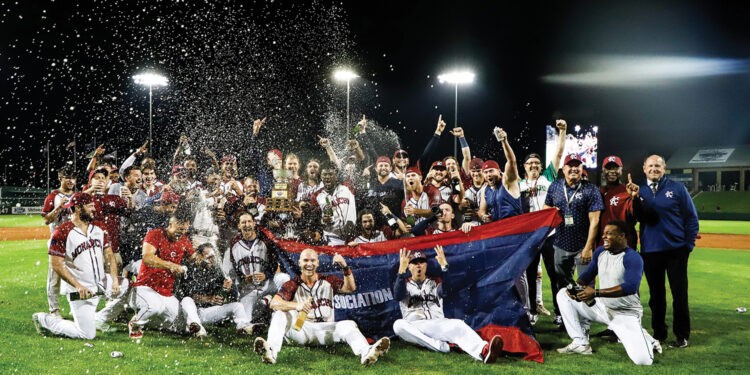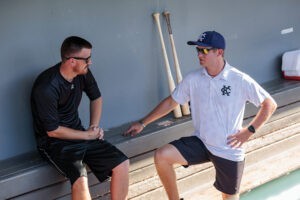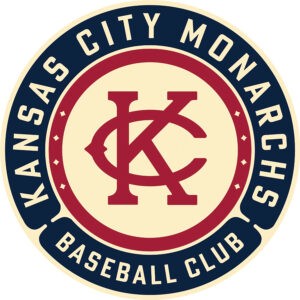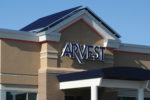TRAINING for the WIN

Story by Jeanie Edgmon

The crack of the bat echoes through Legends Field as another Kansas City Monarchs season builds toward championship glory. But behind every powerful swing, every lightning-fast steal, and every game-saving catch lies a comprehensive training and medical program that’s transforming how professional baseball approaches athlete health and performance.
The four-time Miles Wolff Cup Champion Kansas City Monarchs have built their dynasty not just on talent, but on an innovative partnership with Dr. Michael Dempewolf that ensures their athletes are primed for peak performance from the first pitch of spring training to the final out of the championship series.

The Medical Support Behind the Monarchs
 Michael Dempewolf, DO, MBA a fellowship-trained and sub-specialty board-certified sports medicine orthopedic surgeon, specializing in shoulder, elbow, and knee conditions, focusing on competitive athletes. His credentials read like a blueprint for excellence: dual degrees from Kansas City University, chief resident during his orthopedic surgery residency, and advanced Sports Medicine Fellowship training at the prestigious Hoag Orthopedic Institute in Southern California, where he worked with the Los Angeles Angels.
Michael Dempewolf, DO, MBA a fellowship-trained and sub-specialty board-certified sports medicine orthopedic surgeon, specializing in shoulder, elbow, and knee conditions, focusing on competitive athletes. His credentials read like a blueprint for excellence: dual degrees from Kansas City University, chief resident during his orthopedic surgery residency, and advanced Sports Medicine Fellowship training at the prestigious Hoag Orthopedic Institute in Southern California, where he worked with the Los Angeles Angels.
“From a medical perspective, the most common injuries I see in baseball are shoulder impingement, elbow overuse injuries, and acute knee ligament injuries,” Dr. Dempewolf explains. “Baseball places unique stresses on the body – the explosive rotation during pitching, the sudden stops and starts of base running, the diving catches that can stress every joint. We’re dealing with athletes who demand peak performance in these highly specialized movements.”
As team physician for the Kansas City Monarchs, Johnson County Community College, the Kansas City Blues Rugby organizations, and Sunflower State Football Club, Dr. Dempewolf brings unparalleled expertise to the diamond. His approach goes beyond treating injuries – it’s about preventing them entirely.
The Athletic Training Arsenal

On Right -Nick Hiller -Athletic Trainer
Working alongside Dr. Dempewolf is Nick Hiller, the Monarchs’ head athletic trainer, whose comprehensive approach to player preparation has become the gold standard in professional baseball. Hiller’s preseason assessment process is a methodical journey through every aspect of athletic readiness.
“My preseason evaluation starts with a comprehensive movement screening,” Hiller explains. “We assess each player’s mobility, stability, strength patterns, and previous injury history. Every player goes through functional movement screens, shoulder and hip mobility tests, core stability assessments, and sport-specific movement patterns. We’re looking at how they move, not just how strong they are.”
The process is exhaustive by design. Hiller evaluates throwing mechanics, batting stance biomechanics, running gait analysis, and even sleep patterns and nutrition habits. It’s a 360-degree approach that treats each player as a complete athlete, not just a collection of skills.
“I’m looking for asymmetries, compensation patterns, or limited ranges of motion that could predispose players to injury,” Hiller continues. “A pitcher with limited hip mobility might overcompensate with their shoulder. A fielder with ankle stiffness might be more prone to knee injuries. We catch these red flags early.”
The Perfect Partnership
The magic happens in the collaboration between Dr. Dempewolf and Hiller. Their partnership exemplifies how modern sports medicine breaks down traditional silos between medical and training staff.
“Nick and I communicate constantly throughout the preseason,” Dr. Dempewolf notes. “If he identifies a player with concerning movement patterns or a history of injury, that player gets flagged for medical evaluation. We’re not waiting for problems to become injuries – we’re addressing potential issues before they can impact performance.”
Hiller describes their decision-making process: “If I see limited shoulder internal rotation in a pitcher, or if a player reports ongoing discomfort during our assessments, Dr. Dempewolf and I discuss whether that warrants imaging, specialized testing, or modified training protocols. We’re constantly triangulating between what I see in training and what he sees from a medical perspective.”
The red flags they monitor are specific and telling. Dr. Dempewolf watches for previous injury history, especially incomplete rehabilitation, family history of orthopedic issues, and biomechanical deficiencies that increase injury risk. Hiller adds behavioral indicators: changes in throwing velocity, altered movement patterns, or players who seem to be guarding certain movements.

Innovation in Action
Dr. Dempewolf’s expertise in treating competitive athletes extends beyond traditional medicine. He understands that baseball players have unique psychological profiles and performance demands that require specialized approaches.
“Athletes usually have very specific goals in mind when it comes to their recovery,” Dr. Dempewolf explains. “I enjoy the challenge of managing their injuries and working with them to get back to their sport in the most efficient way. There are two sides to any injury, the physical and mental. They are equally important when returning to sport after injury.”
This holistic approach permeates every aspect of the Monarchs’ medical program. The partnership addresses both overuse injuries, which are increasing due to year-round single-sport specialization, and acute trauma injuries common in contact elements of baseball.
Hiller’s training protocols reflect this understanding: “We’re not just building stronger players – we’re building smarter, more resilient athletes. Our strength training includes injury prevention components, our conditioning mirrors game demands, and our recovery protocols are as important as our performance training.”
Recovery and Resilience at Homefield
The partnership extends beyond preseason preparation into season-long athlete maintenance. At Legends Field, the Monarchs have created a comprehensive support system that keeps players at peak performance throughout the grueling 100-game American Association season.
“In-season recovery is where championships are won or lost,” Hiller emphasizes. “We’re managing fatigue, addressing minor issues before they become major problems, and constantly adjusting our approach based on game demands and player feedback.”
Dr. Dempewolf’s role during the season shifts to rapid response and performance optimization. “During the season, I’m available for immediate consultation on any concerns. Whether it’s a pitcher feeling stiffness after a long outing or a fielder dealing with soreness from a diving catch, we address it immediately.”
The recovery protocols include targeted therapy, modified training loads, nutrition optimization, and sleep hygiene – all coordinated between the medical and training staff. It’s a seamless operation that players often describe as feeling like having a personal medical team.
The Championship Formula
The results speak for themselves: the Monarchs have won multiple American Association championships, posting franchise records and setting league standards for offensive production. But beyond the wins and statistics lies something more valuable – a culture of health and performance that sets the standard for professional baseball.
“What makes our program special is the integration,” Dr. Dempewolf reflects. “There’s no separation between medical care and performance training. Nick and I are working toward the same goal – keeping these athletes healthy and performing at their peak.”
Hiller adds, “Players know they have support. They’re not hiding injuries or playing through pain because they’re afraid of losing playing time. They trust that we’ll get them back to full strength as quickly and safely as possible.”
The Future of Sports Medicine
The Monarchs’ approach represents the future of professional sports medicine – proactive, integrated, and athlete-centered. With Sano Orthopedics’ commitment to exceptional care and Dr. Dempewolf’s specialized expertise in sports medicine, the partnership continues to evolve and improve.
“We’re constantly learning and adapting,” Dr. Dempewolf explains. “New research, new technologies, new understanding of how athletes’ bodies respond to training and competition – we incorporate all of that into our program.”
As the Monarchs prepare for another championship run, their comprehensive approach to athlete health serves as a model for professional sports organizations everywhere. It’s not just about treating injuries – it’s about creating an environment where athletes can achieve their absolute peak performance while maintaining long-term health and career longevity.
The crack of the bat at Legends Field isn’t just the sound of baseball – it’s the sound of athletes performing at their peak, supported by a medical and training partnership that represents the very best in sports science and athlete care. In Kansas City, they’re not just training for the game – they’re training for the win.

For more information on the Kansas City Monarchs scheduling/events visit Monarchsbaseball.com 913.328.56181800 Village West Parkway Kansas City, Kansas 66111






